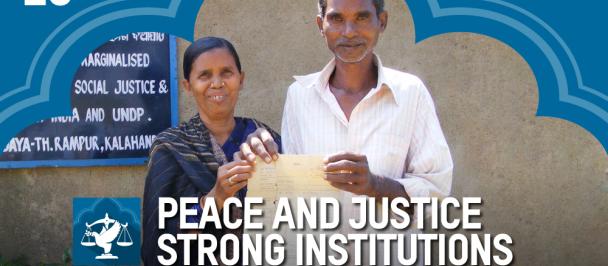Introductory Statement at the Executive Board Annual Session
United Nations Capital Development Fund
June 6, 2019
Mr. President,
Distinguished Members of the Executive Board,
Colleagues and Friends,
I am pleased to introduce the UNCDF item of the Executive Board. The report before you provides Member States with an annual review of results achieved in 2018 by UNCDF. As the first report of the strategic framework for 2018-2021, it examines progress towards UNCDF’s two outcome areas, namely enhancing financial markets and local systems, and unlocking public and private finance.
As you know, we are four years into the 2030 Agenda and close to crossing the threshold into the final ten-year stretch. It is a good time to look at where we are in the financing landscape for the SDGs, and whether we are on track to create the new financing models and pathways that will ensure that we leave no one behind. We know there is plenty of capital in the global economy to achieve our goals. The SDGs are increasingly incorporated into public budgets and development cooperation, and many investors and private sector companies are investing in the SDGs under innovative categories like ‘sustainable finance’. Digital tools are creating new ways for reaching underserved populations and for financing sustainable development.
But we also know that the financing for development architecture is not channeling those resources effectively or at the scale and speed we need to meet our collection ambition to leave no one behind.
Four years into the SDGs, least developed countries still face enormous financing gaps - and these gaps risk widening.
Last year, net bilateral ODA from DAC countries to LDCs fell by nearly 3% in real terms.
UNCDF’s report on blended finance in the least developed countries showed that over 2012-2015, only 7% of private finance mobilized by official development finance benefited LDCs. UNCDF is working with OECD on a data update, which suggests that this figure may have declined over 2016-2017.
Despite increasing focus on the international financial architecture, new DFIs, and mobilizing more private capital for the SDGs, evidence so far would indicate that the deal for the real economy, for localities, for poor populations, and for LDCs is not changing. In other words, we are at risk of hardening exclusions between and within countries, rather than overcoming them.
As an entity focused on demonstrating concrete local finance solutions that work for the poor, this is where UNCDF brings such value.
UNCDF is providing practical and scalable examples of how localizing climate finance can work for local governments; how digital financial services can change economic agency among poor populations and women; and how providing loans and guarantees in the last mile can demonstrate the viability of investment in the real economy in LDCs.
Let me give you some examples of its work. On climate adaptation, UNCDF is channeling climate-resilient grants to local governments in 14 countries. On the back of UNCDF’s demonstration effects, Bhutan and Cambodia have started to upscale this approach to all local governments. To localize more climate resilient finance, this work aims to help local governments gain direct access to such vertical funds as the Green Climate Fund.
UNCDF has contributed to the digital finance revolution by promoting innovation, inclusion and regulatory reforms that are extending financial services to millions of unbanked women, smallholder farmers, young people, and refugees. UNCDF is also using this work to expand clean energy access. Since 2012, UNCDF has contributed to over 13 million adults accessing financial services through digital accounts in 12 countries.
UNCDF’s programme provides critical demonstration value for all of us. It also has the potential – if properly resourced – to become a kind of Special Purpose Vehicle for the UN system as a whole, to place instruments that can de-risk and crowd in investment across the range of UN system work on the SDGs.
UNDP already works extensively with UNCDF from Somalia to the Pacific and Uganda to Cambodia. Together also with UNWOMEN, the three of us work on women’s economic empowerment in LDCs – you will hear more about this shortly.
We also know there is untapped potential for our collaboration on innovative finance. Putting sustainable investment strategies and instruments behind our SDG accelerator labs could help great local initiatives address “missing middle” financing challenge, for example. And we are exploring how using UNCDF instruments in the context of our climate and environment programmes can crowd-in domestic banks and public and private investors to these markets, and pave the way for others to follow.
Together we are implementing proposals in Cambodia, Guinea, and Senegal funded through UNDP’s country investment facility.
And we see the potential for UNCDF to deploy its financing instruments and expertise in support of the work of other UN entities. We are working with UNCDF to ensure it is well positioned to contribute to the work of United Nations Country Teams and their new Cooperation Frameworks.
UNCDF is the secretariat to the UN Secretary General’s Task Force on the Digital Financing of the SDGs, which the UNDP Administrator co-chairs. This is an exciting initiative to identify actionable recommendations for ways that the digital revolution that is transforming the world’s financial systems can be shaped to advance the 2030 Agenda.
If we are serious about getting resources to where they are most needed, we actively need to challenge the status quo and use every available avenue to make that happen.
UNCDF focuses where few others are operating. It stretches every dollar to its maximum. It has put all the right pieces in place to scale its impact.
We are concerned, however, that its potential is undermined by the shortfalls in funding against the targets in the Strategic Framework – and this, just as the UN reform and global development agendas require a doubling down on our financing work.
An investment in UNCDF is an investment in making finance more inclusive and changing how domestic and international investors see the potential of last mile finance in LDCs.
I commend UNCDF for the results it has achieved, and count on your continued support for its critical work.
Thank you.

 Locations
Locations


